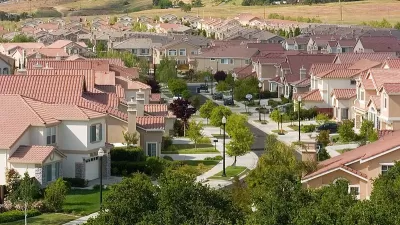Much of the debate about housing shortages and rising housing costs focuses on single-family housing as the main culprit. But could it also be part of the solution?

Kate Wagner considers whether single-family homes really deserve all the blame they receive for the housing crisis in many American cities. Discussions about solutions focus on upzoning and increasing housing supply or instituting policies to ensure affordable housing.
"But the debate also raises larger questions about single-family homes: What is their value in this current political moment? And is it immoral for us to keep building them?" asks Wagner.
She argues that the diversity of single-family homes makes it difficult to understand them as one category, housing for one family or household. "Some single-family houses have history, but little economic value; some have economic value but little history," notes Wagner.
Wagner also believes that these homes are not solely the cause of crises like gentrification and climate change. "That many existing single-family homes could be densified by adding accessory dwelling units or by breaking them up into apartments makes it impossible to see single-family homes as either purely good or purely bad—or to ignore their potential to address some of the problems we face."
FULL STORY: Should we still be building single-family homes?

Maui's Vacation Rental Debate Turns Ugly
Verbal attacks, misinformation campaigns and fistfights plague a high-stakes debate to convert thousands of vacation rentals into long-term housing.

Planetizen Federal Action Tracker
A weekly monitor of how Trump’s orders and actions are impacting planners and planning in America.

In Urban Planning, AI Prompting Could be the New Design Thinking
Creativity has long been key to great urban design. What if we see AI as our new creative partner?

King County Supportive Housing Program Offers Hope for Unhoused Residents
The county is taking a ‘Housing First’ approach that prioritizes getting people into housing, then offering wraparound supportive services.

Researchers Use AI to Get Clearer Picture of US Housing
Analysts are using artificial intelligence to supercharge their research by allowing them to comb through data faster. Though these AI tools can be error prone, they save time and housing researchers are optimistic about the future.

Making Shared Micromobility More Inclusive
Cities and shared mobility system operators can do more to include people with disabilities in planning and operations, per a new report.
Urban Design for Planners 1: Software Tools
This six-course series explores essential urban design concepts using open source software and equips planners with the tools they need to participate fully in the urban design process.
Planning for Universal Design
Learn the tools for implementing Universal Design in planning regulations.
planning NEXT
Appalachian Highlands Housing Partners
Mpact (founded as Rail~Volution)
City of Camden Redevelopment Agency
City of Astoria
City of Portland
City of Laramie





























